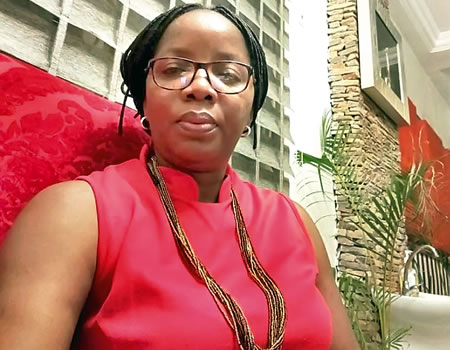Mrs Omobola Thompson is a Public Health practitioner, a preacher and a gender advocate with over 27 years of working in the social sector. The founder of Tabitha-Care Mission also currently works with APIN Public Health Initiative as Regional Lead for Prevention and Community Directorate, which overseas assessment and screening for infectious diseases, care, support and responding to cases of Gender Based Violence. She speaks with OYEYEMI OKUNLADE about what led her into adopting children and how she founded an NGO for widows, orphans and vulnerable persons.
WHAT does APIN Public Health Initiative do?
It used to be called purely APIN before which means Aids Prevention Initiative Nigeria. What we do mainly is to respond to cases of HIV organise activities and programmes that prevent the spread of HIV in Nigeria. We used to be in nine states. At a stage, we looped into what we call APIN Public Health Initiative because we were doing beyond HIV though people are used to it. We also provide care and treatment for tuberculosis patients, malaria and all forms of infectious diseases. We have our presence in all big and small hospitals in Oyo State. This year, we started with about 72 hospitals at federal, state, tertiary institutions and even private facilities. We have our counsellor, volunteers there. We also work with community birth attendants. At a time, up till last year September, we were providing support for orphans and vulnerable children in the state. Our region comprises of Ogun, Osun and Oyo. We pick children and link them to community-based organisations that interact with them directly CSOs to provide support for them. We take them off the streets, enroll them back in school and take care of their education, feeding, clothing, shelter and where applicable, we provide protection services for them.
Nationwide strike: FG hurriedly shifts meeting with labour forward
What about Tabitha-Care Mission?
It is a call, talent, passion, gift and everything to me; it is my life. Now, people call me Tabitha. I started with a ministry called ‘Irresistible Ladies’ Fellowship’ taken from Proverbs 31. We started in 2002. In 2005, we had a formal launch. Majorly, we have fellowship with women above 18 to pray and discuss issues that have to do with women, family, husband, businesses and the like. From time to time, we organise programmes in different places and people come with their challenges. But in July 2008 during my personal retreat, on the last day, I heard ‘Go and take care of widows, they are alone. I want you to make them happy. ’ which was not initially a part of it. That time, I was working with IITA and the salary was not even enough for me. I asked how I would do it.
So, we started in July 2008 by talking to people to send their widows for the programme. Since then, we organise empowerment programme for widows from time to time and also link the young ones among them up for job while we organise mobilisation for those who cannot work again to start or continue their petty trading. We also pay tuition for the registered orphans. I don’t have a home yet because I have not been convinced to, but I have been called from the ministry of Women Affairs because of what we do to come and start a home. To the glory of God, I have never borrowed to run Tabitha Mission and I will never.
Nationwide strike: FG hurriedly shifts meeting with labour forward
Successes you recorded so far?
My first success story is about my hairdresser in her 30s who was sent out of her shop because she could not pay her rent and summarily what she could think of was death. God used us to turn her life around by meeting her needs and setting her up again. Aside this, many widows, orphans and vulnerable lives have received transformation as their hopes are brought alive after interacting, praying and meeting their needs. At present, we have some students in higher institutions, University of Ibadan and UNAB that we are supporting. When I see these people happy, smiling and looking good is a huge success.
As a public health practitioner, what are your experiences with reference to the Nigerian society?
Nigeria is in a sorry state and this always makes us sad each time we go out and see things that are supposed to be in place that are not there. Using our core area as an example, we have people that are on HIV drugs who, before using it, must eat a balanced diet but those people cannot afford it. We would have loved it that the Federal Government’s bargain in the care and treatment of those people are played very well.
We expect our hospitals to be well-equipped with doctors, especially Adeoyo Hospital which is the ‘eye’ of Oyo state. For us, we go out to work and bring clients but where are the doctors and equipments that would be used for treatment? So we believe that government can wake up and motivate our doctors who are running out of this country, to where they would be better paid after spending seven or eight years in the university plus professional examinations and the like they would stay and serve the country.
Government should make things easy for medical personnel. We also face security challenges such as kidnapping because we travel around.
What motivated you to adopt four children?
I feel sad each time I go to orphanage homes and I see plenty children under few care givers. They don’t get the type of love expected from real family. That is my own angle. Each time I look at them, I feel like let me get like three to show them love and get proper home setting. We see beautiful children in homes and you think they are doing well but you would not know the implication of that kind of living until they are old. Most of them do not have attachment to anybody; everybody is their father and mother. There is no trust, they can just open up to anybody. People that are looking up to God for children can adopt them and give them the kind of life they want. If it is just 20 per cent of those children we can take out of homes, I think life would be better.
I adopted four children from a relative whose wife divorced . I told myself that if something is not done quickly, the man may die then what happens to the children? That was what made me adopt all of them but I told him to keep one with him so that he would not be alone.
One of them lived with us till he finished his Polytechnic education, married recently and presently working with an NGO.
What do you think of the culture of adoption that is not embraced in our society?
I think we need a lot of enlightenment and sensitisation. People are superstitious because some give the excuse of not knowing the background of such children. All kinds of stories are stigmatising and could even make those children to withdraw because they feel rejected. When you go to some homes, there are lots of atrocities going on because by the time they get to certain age, the caregivers can’t manage them again. So, this why I will keep talking about adoption.
There are many women out there who need these children but the system is not allowing them to have them. If you come up now that want to adopt, you could be on it for three to five years. They won’t give you the child on time. Why don’t they adopt these children to families that will take care of them? It is true that some people are abusing the children by exchanging their parts of body such as kidney in exchange for their biological children suffering from health challenges. But there are indeed sincere ones who are in need of children to call their own. So instead of crying, adopt children that would be your companion. The media should sensitise the society that a lot of good in adoption.
What is your advice to women in maintaining minimum health standard that can safeguard them from illness and diseases?
The starting point is good hygiene. As a woman, you must take good care of your body because it is the only thing that would remain with you for as long as you will live on this earth. Eat good and best foods. When I go the market, I do not buy spoilt ingredient such as tomatoes, I buy the best. Keep your environment neat. Some Christians spiritualise but I tell them, go to hospitals for regular checkups as scheduled so that you will know on time if anything is wrong with your system and you will be able to take action, because if you know what is happening to you, you would be able to know how to channel your prayers.
In what ways is you initiative contributing to other NGOs to strengthen the crusade against Gender Based Violence, support to the vulnerable and how to raise the stake in public health?
We are not working in isolation. In Oyo state, we have worked with more than eleven NGOs and Community based organizations and have worked with series of other private practices- hospitals, labs and other small maternities. But for NGOs, we worked with other implementing partners such as FHI, SFH, ARHF NHIS, etc. We have been working hand in hand to ensure that the crusade we carry it out together and we also fund them to carry out activities like screening people to know their HIV and other infections status for us. We are also working closely with networks.
What are effects of shortage or lack of professional such as counselors in our schools?
The professionals are there but I don’t know why schools are no longer engaging their services. I know so of our Federal Colleges are still engaging guardian and counselors. I will still like the media to sensitize schools especially school owners. This issue of not engaging professionals to be part of the workforce is really affecting us. That is why you see students combining subjects that are not relevant to the courses to the want to study. It is not the fault of the children because no one is guiding them but if have professionals in our schools, they would be able to guide them. School owners should not be too conscious of the salary or cost of getting these people because they are very useful. We need to get them. Maybe the ambience of private schools taking over everywhere is the cause of not engaging them, I don’t know.
WATCH TOP VIDEOS FROM NIGERIAN TRIBUNE TV
- Relationship Hangout: Public vs Private Proposals – Which Truly Wins in Love?
- “No” Is a Complete Sentence: Why You Should Stop Feeling Guilty
- Relationship Hangout: Friendship Talk 2025 – How to Be a Good Friend & Big Questions on Friendship
- Police Overpower Armed Robbers in Ibadan After Fierce Struggle






